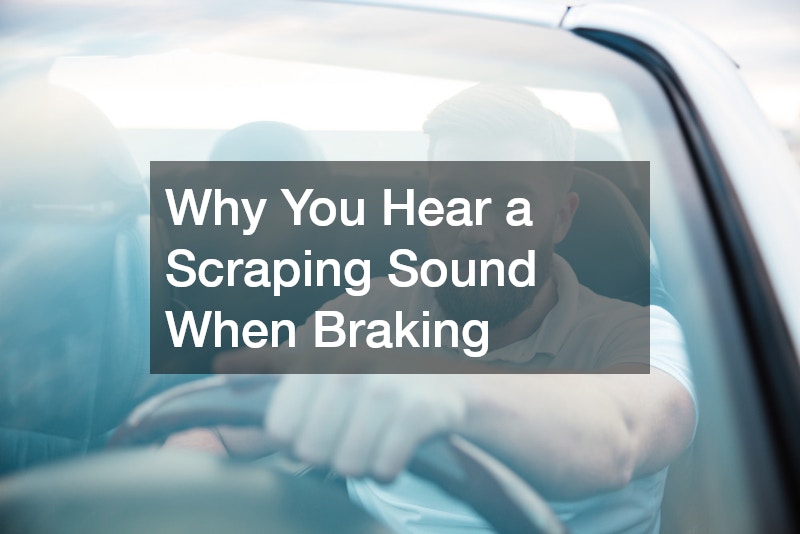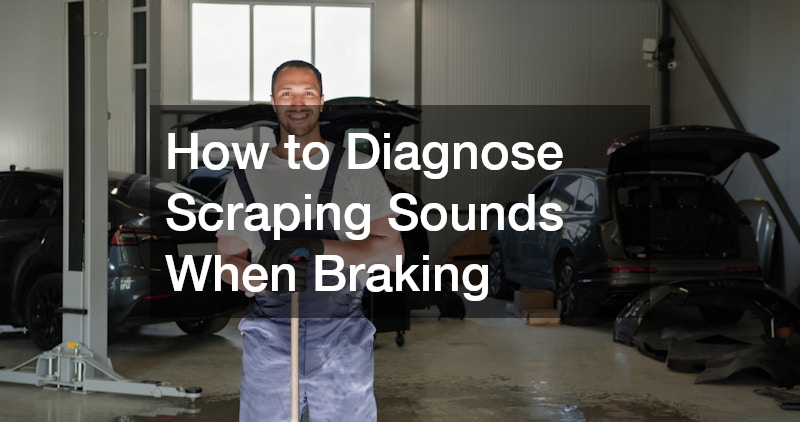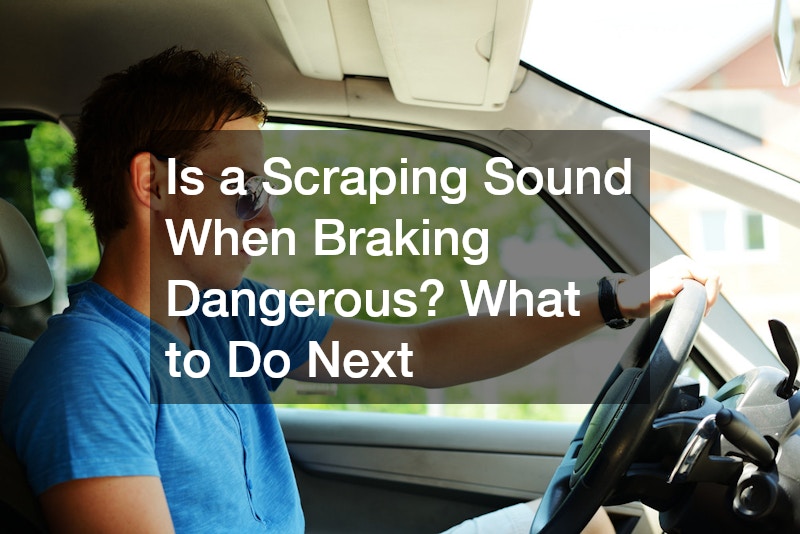Hearing a scraping sound when braking can be alarming. Brakes are one of the most important safety systems in your car, and any unusual noise is a clear sign that something may be wrong. While some noises might be minor and easy to fix, others could mean serious problems that need immediate attention.
This article will walk you through the most common causes of scraping sounds when braking, how to diagnose them, what repairs might cost, and how to prevent future brake problems. By the end, you’ll have a better understanding of what’s happening with your car and how to handle it before it becomes dangerous or expensive.
Why You Hear a Scraping Sound When Braking

There are several reasons you might hear a scraping sound when applying the brakes. Some issues are harmless, while others are serious safety concerns. Common causes include:
- Worn brake pads – When pads wear down, the metal backing plate scrapes against the rotor.
- Debris between the rotor and pads – Small rocks or dirt can get stuck and cause noise.
- Rust buildup – Moisture can cause surface rust on the rotor, leading to scraping until it wears off.
- Damaged or warped rotors – A bent or uneven rotor surface can create scraping noises.
- Loose or broken brake components – Parts like clips, calipers, or shims may move out of place.
Noticing the sound early and identifying the cause can prevent further damage and keep you safe on the road.
Worn Brake Pads: The Most Common Cause
The most frequent reason for scraping sounds when braking is worn brake pads. Brake pads are designed with a friction material that presses against the rotor to slow your vehicle. Over time, this material wears down.
Once pads are thin enough, the metal backing plate can touch the rotor, producing a harsh scraping or grinding sound. At this point, it’s not just a noise problem — your braking ability is reduced, and you’re damaging the rotor with every stop.
Signs of worn brake pads include:
- Scraping or grinding noise that gets louder over time
- Reduced braking performance
- Longer stopping distances
- Dashboard brake warning light
If you suspect worn pads, replace them immediately. Driving on bare metal not only risks your safety but also increases repair costs, since you’ll likely need new rotors as well.
Debris Caught in the Brakes
Sometimes the scraping sound isn’t caused by worn parts but by debris. Small stones, dirt, or road salt can get stuck between the rotor and brake pad. When this happens, you’ll hear scraping or squealing, especially when applying light pressure to the brakes.
What you can do:
- Gently drive in reverse and apply the brakes to see if the debris dislodges.
- Wash the wheels and brakes with a hose to flush out dirt.
- If the sound persists, have a mechanic remove the wheel and inspect the brakes.
Fortunately, this issue is usually minor and inexpensive to fix compared to worn pads or rotors.
Rust Buildup on Rotors
If your car has been sitting unused for a while or you live in a humid area, surface rust can form on the rotors. When you first drive, the brake pads scrape off this thin rust layer, which creates a scraping sound.
Key things to know about rust noise:
- It usually goes away after a few stops.
- If it doesn’t, the rust may be deeper and causing pitting.
- Severe rust can weaken rotors, requiring replacement.
Parking in a garage and driving your car regularly helps reduce rust buildup on brakes.
Warped or Damaged Rotors
Another cause of scraping noises is warped or damaged rotors. Rotors can become uneven from heat, wear, or poor-quality materials. A warped rotor doesn’t allow the brake pad to make smooth contact, which may produce scraping, pulsating, or vibrating when braking.
Warning signs of rotor problems:
- Scraping or squealing that doesn’t go away
- Vibrations in the brake pedal
- Steering wheel shaking when braking
- Uneven stopping power
Rotors can sometimes be resurfaced (machined) if damage is minor. However, in many cases, replacement is the best option.
Loose or Broken Brake Components
Brakes are made of many small parts that need to stay in place to work properly. If clips, shims, or calipers become loose or damaged, you may hear scraping noises. For example, a loose caliper bracket can rub against the rotor, creating a metallic scraping sound.
This type of problem should be inspected by a mechanic as soon as possible. Loose parts can cause uneven braking, reduced stopping power, or even brake failure in extreme cases.
How to Diagnose Scraping Sounds When Braking

While a mechanic can provide the most accurate diagnosis, you can take a few simple steps to narrow down the cause of the scraping noise. Paying attention to the details will help you decide whether it’s a minor issue or something that requires urgent repair.
Pay attention to when the noise happens
- Does it occur only when you press the brake pedal, or can you hear it while driving normally?
- A sound that happens only during braking usually points to the brake system itself, while constant scraping may mean a foreign object is stuck or something else is rubbing against the wheel.
Check the sound’s intensity
- A faint scraping sound could be surface rust forming on the rotors after the car has been sitting overnight. This often clears up after a few stops.
- A louder, grinding noise that doesn’t go away is usually a warning sign of severely worn brake pads or rotor damage.
Look for other symptoms
- Do you feel vibrations in the steering wheel or brake pedal when stopping?
- Is your car taking longer to stop than usual?
- Are any dashboard warning lights (like the brake system light or ABS light) turned on?
These extra signs often point to more serious brake issues that need immediate attention.
Visually inspect the brakes
- If you’re comfortable with basic car maintenance, carefully remove the wheel and check the brakes.
- Look for:
- Worn brake pads – If the pad material looks thin (less than 1/4 inch), it’s time for replacement.
- Damaged rotors – Deep grooves, scoring, or uneven surfaces indicate wear.
- Debris or rust – Small rocks, dirt, or rust buildup can cause scraping sounds.
When in doubt, see a professional
If you’re uncertain about what you find—or if the noise is severe—have a mechanic check your brakes immediately. Ignoring the problem can lead to costly repairs and, more importantly, put your safety at risk.
Cost of Repairs for Scraping Brakes
The cost of fixing a scraping sound when braking depends on the cause:
- Brake pad replacement: $100–$300 per axle
- Rotor resurfacing: $50–$100 per rotor
- Rotor replacement: $200–$500 per axle
- Caliper replacement: $150–$400 each
- Debris removal or cleaning: Often free or under $50
While it may seem costly, ignoring brake issues almost always leads to higher repair bills later.
Dangers of Ignoring Brake Noises
Some drivers delay fixing brake noises, assuming the sound will fade with time. Unfortunately, ignoring a scraping sound when braking can have serious consequences that affect both your safety and your wallet:
- Severely damaged rotors – Continuous scraping can wear deep grooves into your rotors, leading to costly replacements instead of simple resurfacing.
- Reduced braking ability – Damaged rotors or worn pads reduce the surface contact needed for effective stopping, making your brakes less responsive.
- Increased stopping distances – Even a small delay in braking performance can add several feet to your stopping distance, especially dangerous in heavy traffic or bad weather.
- Safety hazards on the road – A scraping noise signals that your brakes aren’t working at their best. This increases the risk of collisions, particularly during sudden stops.
- Higher repair costs – What could have been a quick brake pad replacement can escalate into rotor replacements, caliper repairs, or even complete brake system overhauls if ignored.
- Potential brake failure – In the worst cases, worn-down pads and damaged components may lead to total brake failure, leaving you unable to stop your vehicle safely.
If you hear scraping noises, don’t wait for them to go away—they won’t. Having your brakes inspected promptly can save you money and, more importantly, keep you safe on the road.
Preventing Scraping Sounds in the Future
Good brake care can reduce the chances of hearing scraping noises. Here are some tips:
- Replace brake pads before they wear down completely
- Have brakes inspected every 10,000–15,000 miles
- Avoid riding the brakes, which wears them down faster
- Keep wheels and brakes clean to prevent debris buildup
- Park in a garage to reduce rotor rust from moisture
Staying proactive with brake maintenance helps your car stay safe and saves you money in the long run.
When to See a Mechanic Immediately
Not all brake noises are emergencies, but some require urgent attention. Call a mechanic if you notice:
- Scraping that gets louder over time
- Grinding sounds that continue even when not braking
- Vibrations in the steering wheel or brake pedal
- Warning lights on your dashboard
- Water leaking from ceiling in your car (from a roof or windshield leak) paired with brake issues, as moisture can worsen corrosion
Delaying repairs risks your safety and your wallet.
Conclusion
A scraping sound when braking is never something to ignore. From worn brake pads to rust or debris, the causes vary, but they all point to the need for inspection and maintenance. Understanding the possible reasons, knowing what signs to watch for, and staying on top of brake care can help keep your car safe and reliable.
By acting quickly, you not only protect your safety but also save money on costly repairs. If you ever feel unsure, always seek professional help — your brakes are too important to take chances with.

